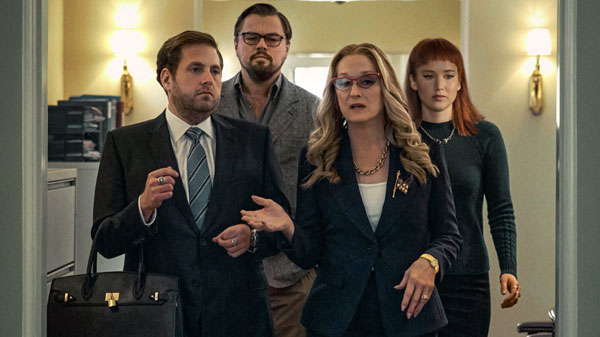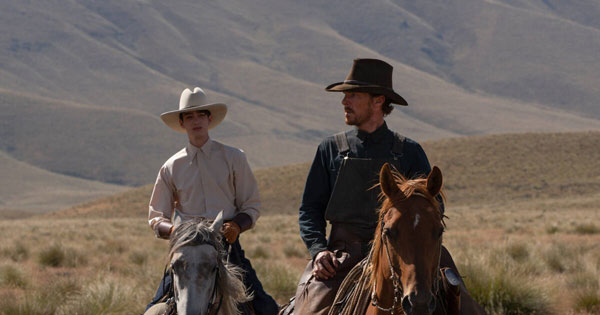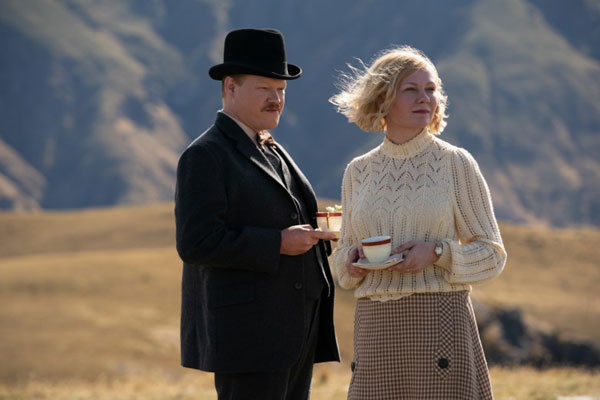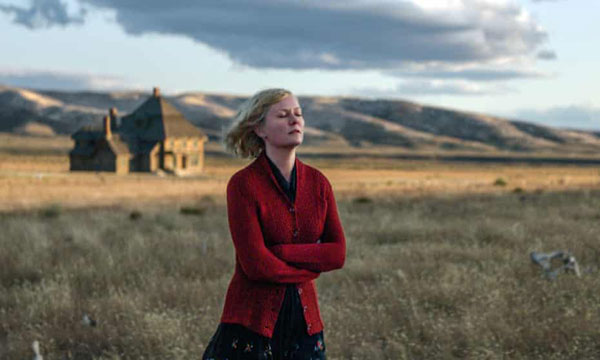|
The endless permutations of the Covid pandemic have disrupted our daily lives in ways we could not
have imagined only two years ago. Two recent movies from Netflix deal, in very different ways and styles, with the subject of disruption. Adam McKay's Don't Look Up is
a brazen satire about, literally, the end of the world. Jane Campion's The Power of the Dog concerns a far more private, intimate disruption—in this case,
in the lives of four people living on a Montana ranch in 1925—but Campion and her cast and crew, building the story in almost imperceptible increments, leave the
audience breathless at the end.
Don't Look Up begins with Kate Dibiasky (Jennifer Lawrence), a doctoral candidate in astronomy at Michigan State University,
discovering a new comet. Dr. Randall Mindy (Leonardo DiCaprio), her thesis adviser, confirms the find, but also confirms something else: the comet, in slightly more than
six months, will collide with Earth, causing the extinction of all life.
The rest of Don't Look Up concerns the efforts of Kate and Mindy to alert the government and the media to the looming catastrophe,
and if possible avert it. Considering the people they encounter in the government and the media, they need all the luck they can get. NASA official Dr. Teddy
Oglethorpe (Rob Morgan) is on their side, but President Janie Orlean (Meryl Streep) and her drippy Chief of Staff son Jason (Jonah Hill) don't see how this news could possibly
help them in the midterms. Similarly, talk-show hosts Brie Evantee (Cate Blanchett) and Jack Bremmer (Tyler Perry) are more concerned about ratings and "keeping it
light" than their impending obliteration. Kate, angry and disbelieving at the indifference she encounters, is quickly pilloried in social media, libeled by her
journalist boyfriend (Himesh Patel), and disowned by her parents. However, the more malleable, camera-ready Mindy becomes a media star and the new lover of the predatory
Brie.

Meanwhile, Orlean faces imminent scandal and decides the comet provides a welcome distraction. She announces a government program to
alter the comet's course, but high-tech billionaire Peter Isherwell (Mark Rylance), a major donor to Orlean's campaign, smells big potential profits and usurps the project.
Reviews of Don't Look Up have been fiercely mixed. The negative reviews
have accused McKay and his collaborators of creating a film that lacks subtlety and cynically makes its political satire non-specific so as not to
alienate potential audience members. The first charge is undeniable; Don't Look Up is about as subtle as—well, a wildfire. Or a tornado, or a flood.
That is McKay's point. Not even Mr. Magoo could miss the parallels between the comet and the disasters wrought by climate change, and the
events of the past several years—political as well as climatic—make subtle satire impossible. Dr. Strangelove wasn't subtle either about the dangers
of nuclear war, and while Don't Look Up isn't as great as Kubrick's film, it's still pretty darn good.
Because Don't Look Up is so effective, the second charge—that McKay
pulls his political punches—leaves me puzzled. Janie and Jason Orlean are obviously an amalgam of a certain 45th President and his equally egregious
family members, to the point that not even their most ardent supporters could mistake them for anyone else. In any case, any direct reference to
actual political figures would have dated the film fatally. Also, the portrayal of the movie's more generic political types is sharp enough to
support the satire. (One of the funniest running gags is Kate's constant complaints about a Pentagon general who charged her for snacks that were
actually free.) The star-studded cast is well up to playing the crazed characters on display; my favorite is Rylance, whose Peter Isherwell is essentially HAL 9000 from 2001: A Space Odyssey in human form.
Whereas Don't Look Up crashes into your consciousness, The Power of the Dog insinuates itself like a virus. That is an apt simile to use in the case of The Power of the Dog, although I would be giving away too much to
explain why.

The film begins with a voiceover by Peter Gordon (Kodi Smit-McPhee)
about how he wanted to protect his mother Rose (Kirsten Dunst) after his father's death. "What kind of man would I be if I did not try to help my
mother?" he asks rhetorically. "If I did not save her?"
The action then switches to the vast ranch owned by the Burbank brothers,
Phil (Benedict Cumberbatch) and George (Jesse Plemons). Phil is rough, sardonic, volatile; George is slow and phlegmatic. Their parents, referred
to as "The Old Gent" and "The Old Lady," no longer live on the ranch; it is never explained why, though we have our guesses by film's end. Phil
disdains the comforts of the ranch house, bathing in a nearby creek instead of the bathtub. "I stink and I like it," he says. He mocks George, calling
him "Fatso" and reminding him that he was "too dumb" to finish college. (Phil himself is a Phi Beta Kappa from Yale.) He also talks constantly
about Bronco Henry, the brothers' mentor in ranching and cowboying, holding him up as the true ideal of a man.
Phil, George and their ranch hands patronize Rose and Peter's little hotel
-restaurant whenever they come to town. Phil is rude to Rose and insults Peter for his effeminate manner and penchant for making paper flowers.
Rose dissolves in tears; George goes after her to apologize; one thing leads to another, and soon George and Rose—to Phil's great displeasure—are husband and wife.

George's money allows Peter to follow his dream and go off to medical
school. For Rose, however, life on the ranch soon becomes hell. Phil goes out of his way to make her feel unwelcome. George, well-meaning but
oblivious, pressures Rose into becoming a grand hostess. At one point he insists that Rose should play piano at an upcoming dinner party in honor
of the governor (Keith Carradine). In one of the film's most harrowing scenes, Rose practices a halting version of the "Radetzky March;" she is
interrupted by Phil, who plays the same tune—masterfully—on his banjo. This leads only to further humiliation at the dinner party itself.
Soon Rose, who previously avoided alcohol, is hiding liquor bottles around
the house and yard. By the time Peter returns to the ranch on summer vacation, she is a wreck. What happens after Peter's return—especially
what happens between Peter and Phil—forms the dramatic crux of The Power of the Dog, and must not be revealed. It is enough to say that
Campion presents the details meticulously, allowing them to accrue, until at the end they blow up in our faces. It is pertinent to quote the verse from
Psalm 22 presented toward the end, from which the story takes its title: "Deliver my soul from the sword, my darling from the power of the dog."
Campion shot the film in her native New Zealand, which doubles effectively for Montana. She assembled a superb crew; Ari Wegner's
photography resembles a collaboration between Charles Russell and Rembrandt, and Jonny Greenwood's eerie music underscores Campion's
work as firmly as it did Paul Thomas Anderson's in The Master and There Will Be Blood.

Her quartet of lead actors is just as extraordinary, if not more so. It is
interesting how Campion has paired them off according to appearance. Plemons and Dunst are fair-haired and baby-faced, their characters too
innocent to defend themselves against the lupine Phil. (For the record, they are a couple in real life.) Cumberbatch and Smit-McPhee—with their
angular, Modigliani-like faces and dark foreboding eyes—look and seem much more like brothers than Cumberbatch and Plemons. Phil and Peter
are both men of solitary habits—exactly how solitary becomes apparent as the film progresses. Also as the film progresses, we learn that Peter is a lot
tougher than he first appears. This is especially apparent in one scene involving a snared rabbit, but there are many other signs, which Campion
deploys with an artist's precision.
The Power of the Dog is at its heart a mystery, albeit an unusually
profound and subtle one. The mystery it presents is the most convoluted of all—that of the human heart. It is a film that both haunts and grows in
the memory. There aren't many movies that present themselves as instant masterpieces, but The Power of the Dog is one.
|